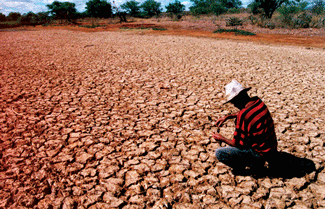From the Open-Publishing Calendar
From the Open-Publishing Newswire
Indybay Feature
The Destructive Agrarian Reform Policies of the World Bank
Examines the effects of World Bank land reform policies on farmers in several developing countries including India, Thailand, Mexico, Columbia, South Africa, and Zimbabwe. Also provides an overview of various social movements responding to World Bank programs.

1. Introduction
During the past decades, many people believed in the idea that the rural areas did not have an important role in economic development. The process of migration from the countryside to the cities, especially in southern countries, was based in the image of the urban areas as the main places to find economic opportunities.
In fact, the rural areas are very rich and concentrate the majority of natural resources, such as water, farm land, minerals, and biodiversity. It's not a coincidence that international financial institutions, like the World Bank, focus their projects on these regions.
The World Bank has a clear policy regarding the so-called "land markets". Its strategy includes the following programs: land surveys and mapping, land titling with alienable titles, facilitation of land markets, credit based on the "willing-seller / willing-buyer" formula, "partnerships" between rural workers and landowners, and privatization of all land and natural resources.
The Bank ideology defends the idea of keeping "small governments". Its policies benefit large landowners and corporations, increasing land concentration. According to these policies, small farmers should become more "efficient" by incorporating themselves into the agrobusiness sector.
The World Bank has been implementing these projects all over the world, always following the same formula, and generating similar effects. In order to deal with this problem, several community-based organizations and grassroots movements created an international network to monitor and denounce the negative impacts of World Bank policies. The goal of the Land Research and Action Network is to create alternative proposals and to promote the policies proposed by the Via Campesina-a network of peasants and small farmers in 60 countries.
These organizations believe that a financial institution like the World Bank should not have such a strong influence in determining policies for rural areas, including mechanisms for the appropriation of land and natural resources. Each country should determine its own public policy, according to the historic and current demands of each society. In this context, the rural grassroots organizations should play a central role in implementing policies that guarantee a democratic distribution of land and the preservation of natural resources.
2. The World Bank Under Suspicion
3. The "Traps" inherent in Land Market Policies
4. Brazil
5. Colombia
6. Guatemala
7. India
8. Mexico
9. South Africa
10. Thailand
11. Zimbabwe
12. Positions of Via Campesina
13. Bibliography
14. Table of Contents
The full report is available free online at:
http://www.social.org.br/cartilhas/cartilhaingles003.htm
During the past decades, many people believed in the idea that the rural areas did not have an important role in economic development. The process of migration from the countryside to the cities, especially in southern countries, was based in the image of the urban areas as the main places to find economic opportunities.
In fact, the rural areas are very rich and concentrate the majority of natural resources, such as water, farm land, minerals, and biodiversity. It's not a coincidence that international financial institutions, like the World Bank, focus their projects on these regions.
The World Bank has a clear policy regarding the so-called "land markets". Its strategy includes the following programs: land surveys and mapping, land titling with alienable titles, facilitation of land markets, credit based on the "willing-seller / willing-buyer" formula, "partnerships" between rural workers and landowners, and privatization of all land and natural resources.
The Bank ideology defends the idea of keeping "small governments". Its policies benefit large landowners and corporations, increasing land concentration. According to these policies, small farmers should become more "efficient" by incorporating themselves into the agrobusiness sector.
The World Bank has been implementing these projects all over the world, always following the same formula, and generating similar effects. In order to deal with this problem, several community-based organizations and grassroots movements created an international network to monitor and denounce the negative impacts of World Bank policies. The goal of the Land Research and Action Network is to create alternative proposals and to promote the policies proposed by the Via Campesina-a network of peasants and small farmers in 60 countries.
These organizations believe that a financial institution like the World Bank should not have such a strong influence in determining policies for rural areas, including mechanisms for the appropriation of land and natural resources. Each country should determine its own public policy, according to the historic and current demands of each society. In this context, the rural grassroots organizations should play a central role in implementing policies that guarantee a democratic distribution of land and the preservation of natural resources.
2. The World Bank Under Suspicion
3. The "Traps" inherent in Land Market Policies
4. Brazil
5. Colombia
6. Guatemala
7. India
8. Mexico
9. South Africa
10. Thailand
11. Zimbabwe
12. Positions of Via Campesina
13. Bibliography
14. Table of Contents
The full report is available free online at:
http://www.social.org.br/cartilhas/cartilhaingles003.htm
For more information:
http://www.social.org.br/cartilhas/cartilh...
Add Your Comments
We are 100% volunteer and depend on your participation to sustain our efforts!
Get Involved
If you'd like to help with maintaining or developing the website, contact us.
Publish
Publish your stories and upcoming events on Indybay.
Topics
More
Search Indybay's Archives
Advanced Search
►
▼
IMC Network


